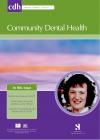Community Dental Health

- Cover Date:
- June 2012
- Print ISSN:
- 0265 539X
- Vol:
- 29
- Issue:
- 2
Prevalence of necrotizing ulcerative gingivitis and associated factors in Koranic boarding schools in Senegal
Background: Necrotizing ulcerative gingivitis is the most common clinical syndrome preceding noma. It is found in developing countries and in malnourished children and especially in deprived groups such as children at Koranic boarding schools. The objective of this study was to determine the prevalence of necrotizing ulcerative gingivitis and factors associated with its occurrence in a boarding school population. Methods: This was a cross-sectional study of children in Koranic boarding schools in the city of Touba, Senegal. A multistage sampling strategy was used and 8 out of 17 schools were selected. The variables collected were gender, age, oral hygiene habits, duration of residence, presence of ulcerative gingivitis and plaque, and gingival bleeding index. A logistic regression analysis with R software using the manual procedure down was used to identify factors associated with the dependent variables. Results: There were 501 participants and boys made up 92% of the study group. The mean age was 9.3 (sd 4.0) years. The mean of duration residence was 3.4 (sd 1.5) years. The prevalence of necrotizing ulcerative gingivitis was 37% and 81% of children did not use a toothbrush or a chewing-stick. The length of residence, school size, hygiene habits and plaque and bleeding indices were significantly associated with necrotizing gingivitis after adjustment for other variables. Conclusion: It is necessary to develop oral hygiene programs, to establish policies to manage the oral health of children and to improve health and nutrition at Koranic boarding-schools.
Keywords: necrotizing ulcerative gingivitis, noma prevalence, risk factors, children, Koranic boarding school, Daara, Senegal
- Article Price
- £15.00
- Institution Article Price
- £
- Page Start
- 184
- Page End
- 187
- Authors
- M. Diouf, D. Cisse, A. Faye, P. Niang, I. Seck, D. Faye, C.M.M Lo
Articles from this issue
- Title
- Pg. Start
- Pg. End
- Dental Public Health in Action - The Platform for Better Oral Health in Europe Report of a New Initiative
- 131
- 133
- Effect of national recommendations on the sale of sweet products in the upper level of Finnish comprehensive schools
- 149
- 153
- A review of strategies to stimulate dental professionals to integrate smoking cessation interventions into primary care
- 154
- 161
- When Can Oral Health Education Begin? Relative effectiveness of three oral health education strategies starting pre-partum
- 161
- 167
- Clinical evaluation of three caries removal approaches in primary teeth: A randomised controlled trial
- 173
- 178
- Relationship between gingivitis severity, caries experience and orthodontic anomalies in 13-15 year-old adolescents in Brno, Czech Republic
- 179
- 183
- Prevalence of necrotizing ulcerative gingivitis and associated factors in Koranic boarding schools in Senegal
- 184
- 187
